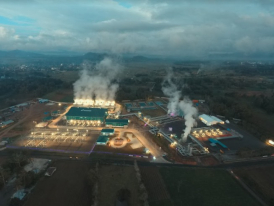Defense minister discusses maritime defense build up with Navy chief
Minister of Defense Sjafrie Sjamsoeddin met with Navy Chief of Staff Admiral Muhammad Ali on Monday, December 23, 2024, discussing measures to strengthen the country's sovereignty in the maritime defense sector.
In the meeting, Sjafrie emphasized the importance of strengthening Indonesia's defense strategy to face theincreasingly complex global dynamics and the need for modernization of defense capabilities based on sophisticated technology, which is adaptive to international developments.
He highlighted the transformation of the maritime sector as a top priority to strengthen the country’s PrimaryWeapons System Equipment (alutsista) and encouraged collaboration between the Indonesian Navy and the domestic defense industry to produce modern defense equipment that is capable of meeting Indonesia's maritime defense needs.
"We need to respond to global challenges by increasing modern and high-tech defense capabilities," Sjafrie said as quoted in a statement.
In addition, the Minister of Defense emphasized the importance of making the maritime defense sector a main pillar in maintaining state sovereignty. This focus includes securing maritime areas that are rich in natural resources and strategic as international trade routes.
Defense diplomacy was one of the important points in the discussion. Sjafrie suggested increasing joint exercises with partner countries to strengthen international relations, while increasing the readiness of the Indonesian Navy. Joint Exercises is expected to support maritime security stability and prevent potential threats in Indonesian waters.
"Active defense diplomacy and strong synergy between the Ministry of Defense, the Indonesian Military (TNI), and domestic defense industry are keys to creating a reliable and authoritative maritime force," he cited.
Military-defense industry collaboration
Close cooperation between the military and domestic defense industry is expected to help support the country in responding to global challenges, while maintaining maritime security stability.
This effort is also part of the national strategy in maintaining territorial sovereignty, securing natural resources, and ensuring smooth flow of international trade routes.
Already have an account? Sign In
-
Start reading
Freemium
-
Monthly Subscription
30% OFF$26.03
$37.19/MonthCancel anytime
This offer is open to all new subscribers!
Subscribe now -
Yearly Subscription
33% OFF$228.13
$340.5/YearCancel anytime
This offer is open to all new subscribers!
Subscribe now






